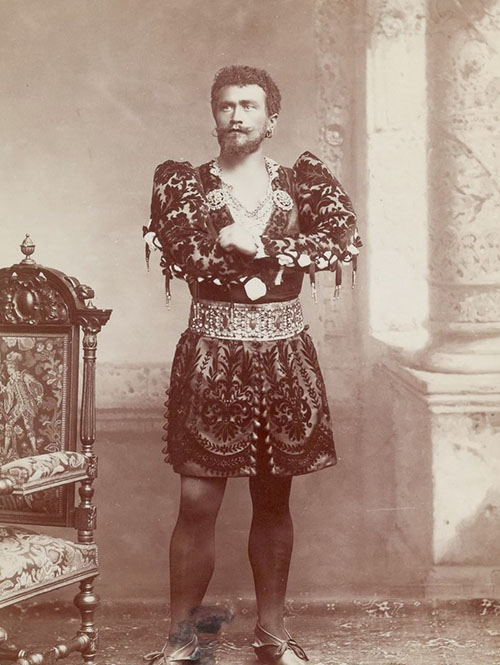ALBERT SALEZA (1867 - 1916)
Albert Saléza was born on October 18, 1867 . He was the youngest in a family of sandal makers with twelve children. His paternal family came from Salles en Lavedan whose inhabitants are called Salézans or Salézaas, hence the name of Saléza.
Orphaned at eight, he was sent to Gironde to a property belonging to Senator Calvet where he was employed as a shepherd's aide. He was not happy there and returned to Bruges to work as sandal maker, which barely earned enough to buy food. At sixteen, he could neither read nor write. He is a hard worker and to earn a living, he works as a terrassier on the construction sites of the Pau-Laruns railway. Then he went to work in Bayonne where the wages of sandaliers were higher than in Bruges.
Singing in choir as in all workshops, his tenor voice is noticed by two Bayonnais music lovers MM. Doubrères, wine merchant and Albert Lion, double bassist at the Bayonne theater. It is presented to Mr. Jubin, director of the music school and entrusted to Professor Gaston Salzedo. From then on his destiny is fixed. He made rapid progress in all fields: general education, diction, study of music and song, lyric repertoire, etc. So that in July 1886, he won the first prize at the end of the year.
At 19, Albert Saléza was admitted to the Paris Conservatory. In 1888, he won the first song prize and the second declamation price before a jury including the composers Ambroise Thomas and Léo Delibes.

MM. Doubrères and Jubin and the Lyre paloise contributed greatly to the student singer's study costs. Here is a funny anecdote; always ready to help the student Saléza, we ask for a grant in his favor from the municipality of Bruges. The municipal council meets and the rapporteur concludes with this unexpected apostrophe: “A purse? To sing? But you want to laugh; we all sing here! Later, Saléza will confide in her friends: " Yes, I worked a lot at the Conservatory because my benefactors trusted me. I wanted to justify it "
The directors of the Opera and the Opéra-comique vie for the handsome singer, but he has worked so hard that already weighs on the hardships of his childhood and hard-working youth. Her voice is too delicate and tender to run the risk of breaking it in the deadly Opera vessel. He therefore began at the age of 20 at the Opéra-Comique in the role of Mylio from the "King of Ys". He enthused the regulars of the Salle Favart, who were spoiled at that time. The Bearn colony of Paris does not fail to applaud it at the same time as the Pau René Fournets, noble bass. Louis Barthou, another famous Bearnais, declared: "My best artistic memory remains the interpretation of the King of Ys by Saléza"
From the Opéra-Comique where he incarnates the main roles, and after two seasons at the Opéra de Nice where he restores his health… by singing in Faust, Romeo and Juliet, Carmen, Richard III…, Saléza goes to the Opera of Paris for the creation of "Salammbô" by Reyer. This one, after an audition, does not want another tenor to interpret the role of Mathô. He had to be rewarded for this choice because the hero of Flaubert was never better interpreted so much that at the dress rehearsal, the enthusiastic public invaded the scene! He will now go from success to success, from triumph to triumph: Le Cid, La Walkyrie, la Damnation de Faust… The great Italian composer Giuseppe Verdi offers him the role of Otello which he will sing in French 35 times until May 4 1895. Albert Saléza whose fragile health affects his vocal cords takes a leave of two years which he spends in Bruges. He gets married, sees the birth of his first son named Mylio and completes the construction of his castle located on the heights of the village, facing the Pyrenees..
In 1897, barely 30 years old, he returned to the Paris Opera then, the following year, was hired at Covent Garden in London where he sang in Carmen with Emma Calvé, Romeo and Juliet with Nelly Melba (the most famous diva of the time, inspiring "fishing") Whenever he sang, King Edward VII was in his royal box. He invited him to Windsor to discuss the charms of the Basque Coast. America then reaches out to him. In Chicago and at the "Metropolitan" of New York, he triumphs in Faust, Lucie de Lamermoor, Les Huguenots… A critic writes: "With such a flat, Saléza conquered New York".

Albert Saléza is then at the height of his glory. He sings in Italian as easily as in German and he amazes the spectators with his impeccable pronunciation. After accumulating laurels abroad, he returned to France. In 1912 he was appointed professor of lyrical declamation at the Conservatory where his students won first prizes in all year-end competitions . His most authoritative biographer, Henri de Curzon, writes in the "journal of debates": "He was one of those people whose blade is said to wear out the sheath. By dint of living his roles, they have escaped him and life itself has closely followed his voice ... " Albert Saléza gives his last lesson on November 25, 1916. The next day, during the eleven hour mass at Saint Charles de Montceau, he collapsed suddenly. The Palois chronicler Georges Coustal writes: "Mylio, Mathô, Romeo, José, Othello, Rodolphe, were mourning like all the lyric theater of which Saléza was one of the most illustrious representatives". Thanks to some friends, a bust of Albert Saléza, due to the chisel of Ernest Gabard, was raised in Pau, in the Beaumont park, then later transferred to the Town Hall.
There are many anecdotes about Saléza. Here is one reported by the father of Lucien Labarère who got it from Saléza himself: "The anecdote that amused me the most happened in New York at the time of its splendor. It was in a very chic where Albert Saléza was dining with friends. The butler, passing behind him, drops a fork and, instinctively, he escapes a swearing from Bearn. Saléza turns around and says to him: "From where you? - From Bruges - From oun? - Deu Begué "(-Where are you from? - From Bruges - From which house? - From Bégué) It was the name of the peasant from whom Saléza had bought the property where he built his castle. Good luck, isn't it? "
In Bruges, Saléza was interested in local politics. This aristocrat of the scene and the song had remained faithful to his sandaliers friends with whom he had shared the miseries and whose candidates he supported in the elections. One evening of electoral battle in Capbis, the republican candidate who arrived too late, found the inn, the only possible meeting place, praised by his "reactionary" adversary. Warned, Saléza arrives at the gallop of his horse and hangs the innkeeper in Béarnais: "- And your room on the first floor? - She is free " Saléza climbs to the first floor, opens the large windows and begins the" Beth ceù de Pau "Immediately, the ground floor is emptied: " Let Ey Saléza qui cante! Puyem! " (It's Saléza who sings! Let's go up!) And the reactionary competitor remains alone in front of the tables loaded with electoral wine and the empty benches.

The drama of the life of this prodigious singer was, despite his robust appearance, that of his fragile health affecting his vocal cords . The disappointments, the sudden stops are as numerous as its triumphs. He struggled until the exhaustion of his forces before succumbing at the age of 49, November 26, 1916.
Albert Saléza is buried in the old cemetery of the Saint Martin church in Biarritz in the vault of the Bonnecarrère family. He rests there with his wife Pauline and his two sons Mylio and José.
In Bruges, a commemorative plaque is placed on the pediment of his birthplace, at number 2, rue Albert Saléza.
